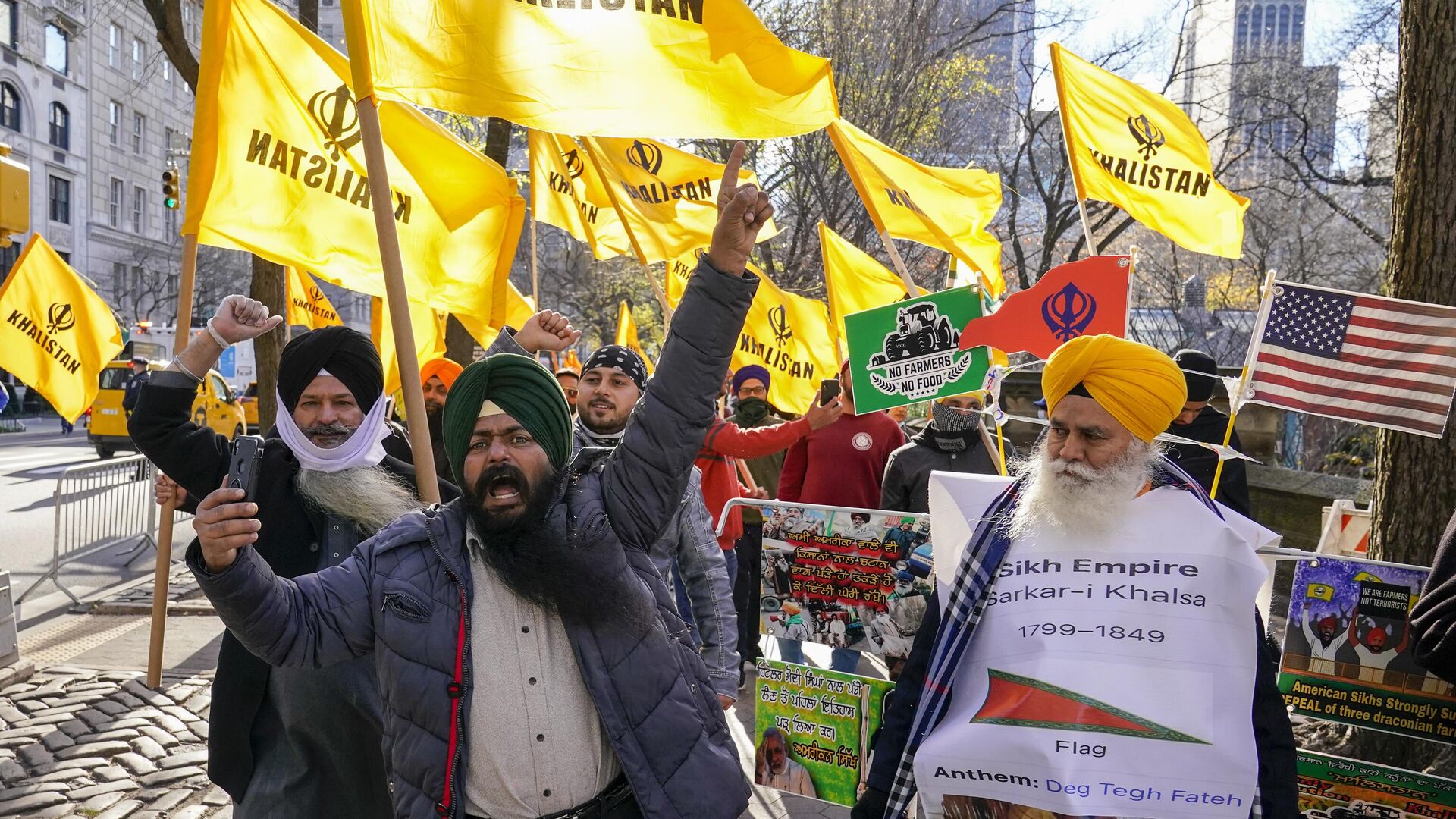https://sputniknews.in/20250206/trumps-fentanyl-crackdown-puts-scanner-on-khalistan-narco-nexus-8743557.html
Trump's Fentanyl Crackdown Puts Scanner on Khalistan-Narco Nexus
Trump's Fentanyl Crackdown Puts Scanner on Khalistan-Narco Nexus
Sputnik India
There is enough evidence on record to suggest that pro-Khalistan groups operating in Canada and the US have been involved in narco-terrorism in North America in order to fund their secessionist activities, experts say.
2025-02-06T17:29+0530
2025-02-06T17:29+0530
2025-02-06T20:41+0530
donald trump
justin trudeau
canada
india
us
national investigation agency (nia)
enforcement directorate (ed)
inter-services intelligence (isi)
drug smuggling
north america
https://cdn1.img.sputniknews.in/img/07e7/09/13/4330404_0:160:3072:1888_1920x0_80_0_0_0fcbcca07b1c81d8b23a1542dcc4a6a0.jpg
There is enough evidence on record to suggest that pro-Khalistan groups operating in Canada and the United States (US) have been involved in narco-terrorism in North America in order to fund their secessionist activities, experts have told Sputnik India. Citing government statements and previous media investigations into the matter, the think tank chief underlined that drug trafficking was one of the major sources of funding for sustenance of pro-Khalistan groups, which are mainly operating from Canada.Several pro-Khalistan individuals involved in the transnational drug trade were operating from Pakistan, which reportedly has been accused of sympathising with Sikh secessionists, the pundit highlighted citing previous probes by India's National Investigation Agency (NIA)."Khalistanis in the Western countries are supported by the Inter-Services Intelligence (ISI) financially, materially and logistically," asserted Adityanjee.The expert stressed that only a small fraction of the Canada's Sikh diaspora community, the largest outside the Indian state of Punjab, backed the activities and goals of the Khalistan movement.The issue of Khalistan narco-terrorism had its roots in the reign of Muhammad Zia-ul-Haq, the former military ruler of Pakistan, retired Colonel RSN Singh, a former officer at Research and Analysis Wing (R&AW), told Sputnik India.He said that the trend had only been advanced with the large-scale migration, enabled by successive Canadian governments, from Punjab. "Khalistani narco-terrorism links" were first exposed in the 1990s, when two Indian-origin drug dealers linked to banned terrorist group International Sikh Youth Federation (ISYF) were murdered by a rival gang in Vancouver, according to Professor Shinder Purewal, a Indo-Canadian academic and author associated with Canada's Kwantlen Polytechnic University (KPU).Khalistan-groups were involved in the ground transportation of drugs in US and Canada. He said that these drug networks have been mainly run by Colombian mafia and Mexican drug cartels, Purewal stated in a research paper published in the Electronic Journal of Social and Strategic Studies last September.Further, he highlighted Sikh community's presence in North America's trucking industry.Linkages between the pro-Khalistan groups and narcotics smuggling have surfaced from time to time. Last August, India's Enforcement Directorate (ED) raided properties allegedly linked to Jasmeet Hakimzada, who is alleged to have close links to Harmeet Singh, the chief of Pakistan-based secessionist group Khalistan Liberation Force (KLF).The ED said Hakimzada's agents in India were sending the Proceeds of Crime (POC) generated from drug trafficking by Khalistan Liberation Force (KLF), according to an agency statement.In fact, the first Trump administration also imposed sanctions on Hakimzada for "smuggling heroin and synthetic opioids around the world" in 2019, as per a statement at the time by Sigal Mandelker, the Treasury’s undersecretary for terrorism and financial intelligence. Hakimzada has been designated as a "Significant Foreign Narcotics Trafficker" in the US.Indian authorities have accused the Trudeau government of not paying sufficient heed to repeated warnings, with Prime Minister Modi telling Trudeau on the sidelines of the G20 Summit in New Delhi in September 2023 that the "nexus" between pro-Khalistan forces with organised crime, drug syndicates, and human trafficking should be a concern for Canada as well, according to an Indian readout.It appears that the issue of fentanyl smuggling has now emerged as a key bone of contention between Canada and the incoming Trump administration in the US, possibly contributing to Trudeau's decision to step down.Trudeau told Trump in a telephone call this week that he would appoint a "fentanyl czar", list cartels as "terrorists", ensure a 24/7 vigilance on Canada-US border and launch a joint strike force to combat fentanyl flow into the US under a $1.3 billion plan, according to a social media post.
https://sputniknews.in/20230329/ex-canadian-fm-slams-trudeau-govt-for-official-indifference-to-khalistan-movement-1351994.html
canada
india
us
north america
Sputnik India
feedback.hindi@sputniknews.com
+74956456601
MIA „Rossiya Segodnya“
2025
Dhairya Maheshwari
https://cdn1.img.sputniknews.in/img/07e6/0c/13/138962_0:0:641:640_100x100_80_0_0_2cb44360dbcdf6d84bf4b299cd045917.jpg
Dhairya Maheshwari
https://cdn1.img.sputniknews.in/img/07e6/0c/13/138962_0:0:641:640_100x100_80_0_0_2cb44360dbcdf6d84bf4b299cd045917.jpg
News
en_IN
Sputnik India
feedback.hindi@sputniknews.com
+74956456601
MIA „Rossiya Segodnya“
Sputnik India
feedback.hindi@sputniknews.com
+74956456601
MIA „Rossiya Segodnya“
Dhairya Maheshwari
https://cdn1.img.sputniknews.in/img/07e6/0c/13/138962_0:0:641:640_100x100_80_0_0_2cb44360dbcdf6d84bf4b299cd045917.jpg
fentanyl canada, khalistan map, khalistan news, trump fentanyl, trump tariffs, us canada trade war, trump tariffs canada, trump modi, trump news, trump canada
fentanyl canada, khalistan map, khalistan news, trump fentanyl, trump tariffs, us canada trade war, trump tariffs canada, trump modi, trump news, trump canada
Trump's Fentanyl Crackdown Puts Scanner on Khalistan-Narco Nexus
17:29 06.02.2025 (Updated: 20:41 06.02.2025) Two Indian-origin individuals were arrested in Canada last week with eight kilograms of fentanyl. The RCMP hasn't commented on whether they are tied to organised crime, but experts say pro-Khalistan groups have trafficked fentanyl for years.
There is enough evidence on record to suggest that pro-Khalistan groups operating in Canada and the United States (US) have been involved in narco-terrorism in North America in order to fund their secessionist activities, experts have told Sputnik India.
"Sikh-Canadian terrorists who purportedly are involved in fomenting terrorism in India have been financing their illegal activities by indulging in drug trafficking, person trafficking and commercial sex exploitation," US-based Dr Adityanjee, the President of the Council for Strategic Affairs (CSA), told Sputnik India. "The drug trafficking involves fentanyl, heroin, cannabis and other illegal drugs both within Canada as well as across the border with the USA."
Citing government statements and previous media investigations into the matter, the think tank chief underlined that drug trafficking was one of the major sources of funding for sustenance of
pro-Khalistan groups, which are mainly operating from Canada.
"Besides drug trafficking, these groups also depend on other illicit activities to raise funding, including human trafficking, prostitution, offerings from gurudwaras that are controlled by pro-Khalistan entities and smuggling of arms. There are secret funding schemes from the Deep State agencies as well," Adityanjee said.
Several pro-Khalistan individuals involved in the transnational drug trade were operating from Pakistan, which reportedly has been accused of sympathising with Sikh secessionists, the pundit highlighted citing previous probes by India's National Investigation Agency (NIA).
"Khalistanis in the Western countries are supported by the Inter-Services Intelligence (ISI) financially, materially and logistically," asserted Adityanjee.
The expert stressed that only a small fraction of the Canada's Sikh diaspora community, the largest outside the Indian state of Punjab, backed the activities and goals of the Khalistan movement.
"Most Sikh-Canadians are law-abiding citizens and have no love for Khalistanis," Adityanjee underscored.
The issue of Khalistan narco-terrorism had its roots in the reign of Muhammad Zia-ul-Haq, the former military ruler of Pakistan, retired Colonel RSN Singh, a former officer at Research and Analysis Wing (R&AW), told Sputnik India.
"Pakistan actively supported the policy of pushing drugs into Punjab. Punjab has seen the worst of the drug epidemic, with generations being affected due to addiction," the former Indian spy stated.
He said that the trend had only been advanced with the large-scale migration, enabled by successive Canadian governments, from Punjab.
"Today, there is a clear link between Khalistan groups and narcotics trade in Canada and less so in the US. Khalistan is not only a terrorism or a separatism issue for India, but has evolved into a narco-terror issue affecting not only India, but also Canada and the US," Singh explained.
"Khalistani narco-terrorism links" were first exposed in the 1990s, when two Indian-origin drug dealers linked to banned terrorist group International Sikh Youth Federation (ISYF) were murdered by a rival gang in Vancouver, according to Professor Shinder Purewal, a Indo-Canadian academic and author associated with Canada's Kwantlen Polytechnic University (KPU).
Khalistan-groups were involved in the ground transportation of drugs in US and Canada. He said that these drug networks have been mainly run by Colombian mafia and Mexican drug cartels, Purewal stated in a research paper published in the Electronic Journal of Social and Strategic Studies last September.
Further, he highlighted Sikh community's presence in North America's trucking industry.
"A Toronto Star investigation also reported the presence of broker system among the Sikhs drivers. The regulators found that brokers worked with drug dealers and work to find truckers from their own community. They know these truckers won’t disappear with drugs worth millions of dollars because these coordinates know where these truckers are from in Punjab, right down to their villages," Purewal wrote.
Linkages between the pro-Khalistan groups and narcotics smuggling have surfaced from time to time. Last August, India's Enforcement Directorate (ED) raided properties allegedly linked to Jasmeet Hakimzada, who is alleged to have close links to Harmeet Singh, the chief of Pakistan-based secessionist group Khalistan Liberation Force (KLF).
The ED said Hakimzada's agents in India were sending the Proceeds of Crime (POC) generated from drug trafficking by Khalistan Liberation Force (KLF), according to an agency statement.
In fact, the first Trump administration also imposed sanctions on Hakimzada for "smuggling heroin and synthetic opioids around the world" in 2019, as per a statement at the time by Sigal Mandelker, the Treasury’s undersecretary for terrorism and financial intelligence. Hakimzada has been designated as a "Significant Foreign Narcotics Trafficker" in the US.
Last October, the RCMP arrested an Indian-origin person, Gaganpreet Randhawa, after busting what it described as the "largest, most sophisticated drug superlab" in Canada, recovering fentanyl that could have amounted to over 95 million doses. Canadian agencies didn't reveal whether Randhawa was linked to any pro-Khalistan group at the time.
Indian authorities have accused the Trudeau government of
not paying sufficient heed to repeated warnings, with Prime Minister Modi telling Trudeau on the sidelines of the G20 Summit in New Delhi in September 2023 that the "nexus" between pro-Khalistan forces with organised crime, drug syndicates, and human trafficking should be a concern for Canada as well, according to an Indian readout.
It appears that the issue of fentanyl smuggling has now emerged as a key bone of contention between Canada and the incoming Trump administration in the US, possibly contributing to Trudeau's decision to step down.
Trudeau told Trump in a telephone call this week that he would appoint a "fentanyl czar", list cartels as "terrorists", ensure a 24/7 vigilance on Canada-US border and launch a joint strike force to combat fentanyl flow into the US under a $1.3 billion plan, according to a social media post.



